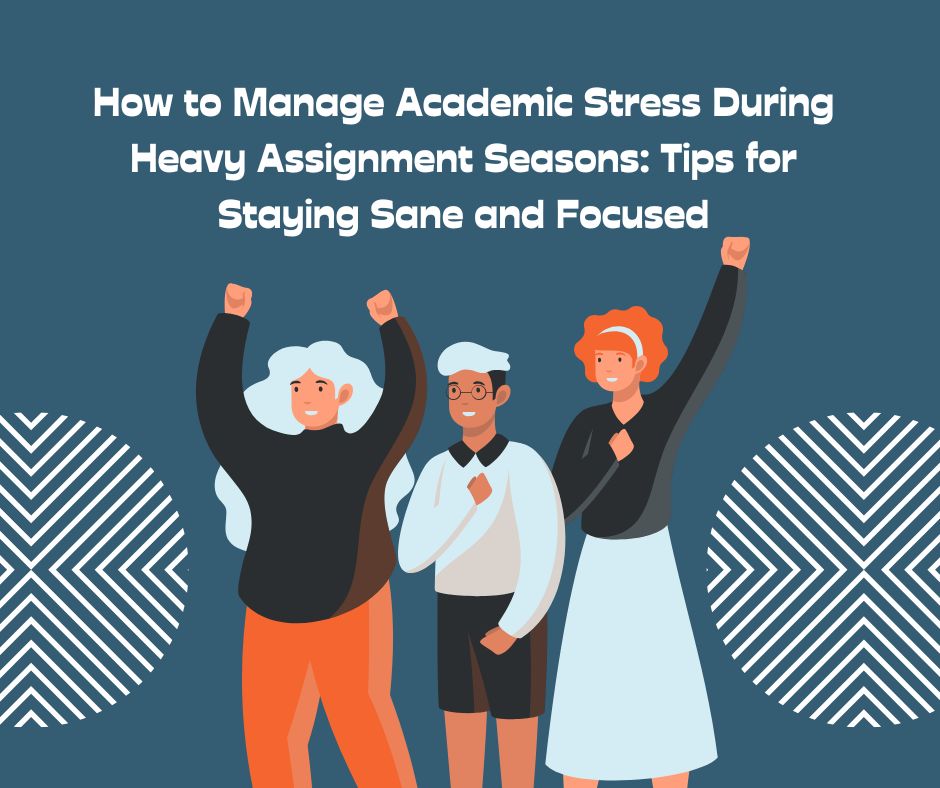How to Manage Academic Stress During Heavy Assignment Seasons

The stress of looming deadlines and multiple assignments can feel overwhelming, especially when they all pile up at once. Whether you’re in the middle of midterms, final projects, or simply dealing with an unusually busy semester, academic stress can take a serious toll on your well-being.
But don’t worry, you don’t have to suffer through it. With a few practical strategies and some proactive steps, you can reduce stress, stay organized, and make it through even the most hectic academic seasons with your sanity intact.
1. Acknowledge Your Stress and Normalize It
The first step in managing academic stress is acknowledging it. If you feel overwhelmed, that’s okay! It’s a completely normal part of the academic experience. You’re not alone—many students feel stressed during heavy assignment seasons. By simply acknowledging your stress and reframing it as a natural response, you’re already taking the first step toward managing it.
Personalized Tip: Instead of focusing on how stressed you feel, try focusing on how to handle the stress. Remind yourself that stress is temporary and that you’ve faced difficult situations before and managed them successfully.
2. Prioritize Your Tasks
When everything feels important and urgent, it’s easy to fall into the trap of multitasking—spreading yourself too thin and not making progress on anything. Instead, take a step back and prioritize.
Start by identifying which assignments are due soonest or require the most time and effort. Use the Eisenhower Matrix (urgent vs. important) or simply create a priority list with deadlines to determine what needs to be tackled first.
Personalized Tip: Use a digital tool like Trello or Todoist, or simply make a handwritten list. Either way, physically organizing your tasks can help reduce the feeling of chaos and give you a clear view of what needs your attention.
3. Break Big Assignments Into Smaller Tasks
Large assignment writing services UK can feel daunting, and the thought of working on them for hours at a time can be intimidating. Instead of sitting down to write a 10-page paper or prepare a 30-minute presentation, break it into manageable tasks.
For instance, you might divide the research, outlining, writing, and editing phases of a paper into smaller, bite-sized chunks. Tackling each task individually will make the entire process feel more achievable and prevent you from feeling overwhelmed.
Personalized Tip: Set specific goals for each work session. For example, “I’ll finish my introduction and first two body paragraphs in the next 90 minutes.” By focusing on one task at a time, you can give yourself a sense of accomplishment and maintain momentum.
4. Create a Realistic Schedule
An effective way to manage academic stress is by setting aside time each day to work on assignments. Create a study schedule and stick to it—this will help you stay on track and ensure that you’re not cramming all your work into one or two nights.
Be realistic about how long each task will take. Factor in time for breaks and relaxation as well! Over-scheduling yourself or not giving yourself enough time to breathe will only increase stress.
Personalized Tip: Use a time-blocking method. For example, allocate 9 AM to 11 AM for deep work, 11 AM to 12 PM for a break, and 12 PM to 2 PM for more focused work. Incorporating breaks is essential to prevent burnout and keep your mind fresh.
5. Practice the Pomodoro Technique
If long study sessions aren’t your thing, the Pomodoro Technique might be the perfect solution for you. This method involves working in short, focused intervals usually 25 minutes, followed by a 5-minute break. After completing four cycles, take a longer break of 15 to 30 minutes.
This technique can help you stay focused and motivated, as it offers a manageable, bite-sized approach to long hours of studying or writing.
Personalized Tip: Use a timer (or a Pomodoro app) to keep track of work intervals. Knowing there’s a break coming up can make it easier to dive into deep work without feeling anxious about long, unbroken study sessions.
6. Stay Physically Active
Stress isn’t just a mental battle—it’s physical too. When your body is physically stressed, it can affect your ability to concentrate and retain information. That’s why making time for regular exercise, even if it’s just a short walk, can do wonders for your mental clarity and overall stress levels.
Exercise boosts your mood by releasing endorphins, reduces feelings of anxiety, and helps you maintain focus throughout long study sessions.
Personalized Tip: Incorporate movement into your daily routine, even if it’s just stretching during your study breaks. You can also try something more active, like yoga, dancing, or going for a run to clear your mind and release tension.
7. Don’t Forget to Sleep
It might seem tempting to pull an all-nighter to finish an assignment, but sacrificing sleep is counterproductive. Lack of sleep impairs cognitive function, memory, and focus, which ultimately makes it harder to complete assignments effectively.
Aim for 7-9 hours of sleep a night, and give yourself time to unwind before bed. A good night’s sleep will help you work more efficiently and make better decisions the next day.
Personalized Tip: Stick to a sleep schedule, even during busy times. Try to go to bed and wake up at the same time every day, which can regulate your internal clock and improve your overall energy levels.
8. Practice Stress-Relieving Techniques
When stress starts to feel like it’s getting the best of you, it’s essential to have a toolbox of stress-relieving techniques ready to go. Deep breathing exercises, mindfulness meditation, or even simple visualization can help you relax in moments of anxiety.
For those who find themselves overwhelmed, a few minutes of focused breathing or a 5-minute meditation session can help reduce tension and reset your mental state.
Personalized Tip: Find the method that works best for you. Apps like Headspace or Calm are great for guided meditation, while short breathing exercises like the 4-7-8 technique (inhale for 4 seconds, hold for 7 seconds, exhale for 8 seconds) are quick and effective.
9. Reach Out for Support
It’s okay to ask for help when things get too much. Talk to friends, family, or your professors if you’re feeling overwhelmed. Sometimes, just sharing your concerns or getting a second opinion can lighten the load.
Additionally, if you’re really struggling to stay on top of assignments, consider seeking academic help. Many universities offer tutoring services, writing centers, or peer mentoring programs that can assist you in managing academic workloads more effectively.
Personalized Tip: If you’re unsure where to seek help, start by talking to your professor or TA. They can often provide extra resources or advice on how to approach the assignment in a more manageable way.
Final Thoughts
Heavy assignment seasons can be tough, but with the right strategies, you can manage your stress and perform at your best. Remember, you don’t have to do it all at once. Take breaks, stay organized, prioritize your tasks, and don’t be afraid to ask for help when you need it.
With these tips, you can tackle your assignments with confidence and grace. Don’t let stress get in the way of your academic success take it one step at a time, and soon enough, the end of the semester will be here, and you’ll have conquered it!



